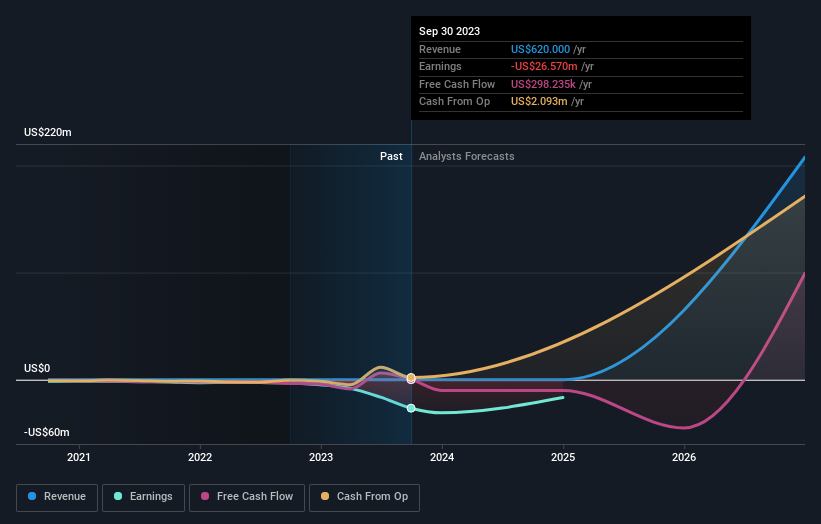Atlas Lithium Corporation (NASDAQ:ATLX) CEO Marc Fogassa's holdings dropped 14% in value as a result of the recent pullback
Key Insights
Insiders appear to have a vested interest in Atlas Lithium's growth, as seen by their sizeable ownership
The top 3 shareholders own 51% of the company
Ownership research, combined with past performance data can help provide a good understanding of opportunities in a stock
A look at the shareholders of Atlas Lithium Corporation (NASDAQ:ATLX) can tell us which group is most powerful. And the group that holds the biggest piece of the pie are individual insiders with 51% ownership. In other words, the group stands to gain the most (or lose the most) from their investment into the company.
And last week, insiders endured the biggest losses as the stock fell by 14%.
In the chart below, we zoom in on the different ownership groups of Atlas Lithium.
View our latest analysis for Atlas Lithium
What Does The Institutional Ownership Tell Us About Atlas Lithium?
Many institutions measure their performance against an index that approximates the local market. So they usually pay more attention to companies that are included in major indices.
We can see that Atlas Lithium does have institutional investors; and they hold a good portion of the company's stock. This implies the analysts working for those institutions have looked at the stock and they like it. But just like anyone else, they could be wrong. It is not uncommon to see a big share price drop if two large institutional investors try to sell out of a stock at the same time. So it is worth checking the past earnings trajectory of Atlas Lithium, (below). Of course, keep in mind that there are other factors to consider, too.
Our data indicates that hedge funds own 5.9% of Atlas Lithium. That's interesting, because hedge funds can be quite active and activist. Many look for medium term catalysts that will drive the share price higher. The company's CEO Marc Fogassa is the largest shareholder with 39% of shares outstanding. With 6.1% and 5.9% of the shares outstanding respectively, Antonis Palikrousis and Waratah Capital Advisors Ltd. are the second and third largest shareholders.
After doing some more digging, we found that the top 3 shareholders collectively control more than half of the company's shares, implying that they have considerable power to influence the company's decisions.
While studying institutional ownership for a company can add value to your research, it is also a good practice to research analyst recommendations to get a deeper understand of a stock's expected performance. There is a little analyst coverage of the stock, but not much. So there is room for it to gain more coverage.
Insider Ownership Of Atlas Lithium
The definition of an insider can differ slightly between different countries, but members of the board of directors always count. The company management answer to the board and the latter should represent the interests of shareholders. Notably, sometimes top-level managers are on the board themselves.
Most consider insider ownership a positive because it can indicate the board is well aligned with other shareholders. However, on some occasions too much power is concentrated within this group.
Our information suggests that insiders own more than half of Atlas Lithium Corporation. This gives them effective control of the company. That means they own US$134m worth of shares in the US$261m company. That's quite meaningful. It is good to see this level of investment. You can check here to see if those insiders have been buying recently.
General Public Ownership
The general public-- including retail investors -- own 35% stake in the company, and hence can't easily be ignored. This size of ownership, while considerable, may not be enough to change company policy if the decision is not in sync with other large shareholders.
Next Steps:
While it is well worth considering the different groups that own a company, there are other factors that are even more important. Consider for instance, the ever-present spectre of investment risk. We've identified 4 warning signs with Atlas Lithium (at least 2 which make us uncomfortable) , and understanding them should be part of your investment process.
But ultimately it is the future, not the past, that will determine how well the owners of this business will do. Therefore we think it advisable to take a look at this free report showing whether analysts are predicting a brighter future.
NB: Figures in this article are calculated using data from the last twelve months, which refer to the 12-month period ending on the last date of the month the financial statement is dated. This may not be consistent with full year annual report figures.
Have feedback on this article? Concerned about the content? Get in touch with us directly. Alternatively, email editorial-team (at) simplywallst.com.
This article by Simply Wall St is general in nature. We provide commentary based on historical data and analyst forecasts only using an unbiased methodology and our articles are not intended to be financial advice. It does not constitute a recommendation to buy or sell any stock, and does not take account of your objectives, or your financial situation. We aim to bring you long-term focused analysis driven by fundamental data. Note that our analysis may not factor in the latest price-sensitive company announcements or qualitative material. Simply Wall St has no position in any stocks mentioned.


